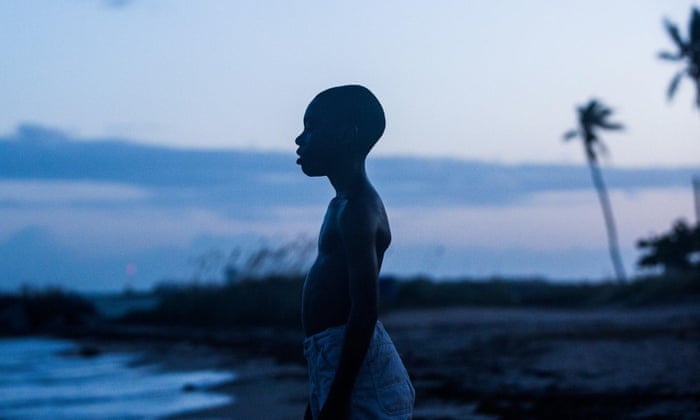
Moonlight is an LGBT film that focuses on black masculinity and nails this specific purpose in every expert shot. It challenges the audience to make up their own judgments until we are screaming for change, but these characters are each to their own, growing up in the tough streets of Miami. Somehow it manages to prioritise its characters above all else while still addressing universal themes.
It follows the story of Chiron who we see grow up in three different sections represented by three different actors. The first to sections or acts show his harsh life that is surrounded by the psychological abuse from his crack-addicted mother (Naomie Harris) and the bullying at school, all the while feeling alienated by his sexuality. Barry Jenkins lights up each scene with magic, giving it that 'moonlight' glows in every scene of brutality and compassion equally.
Chiron as a child (Alex R. Hibbert) is found hiding in a building after being chased by a group of kids by Juan (Mahershala Ali) who is a local drug dealer. He takes him in to eat and even helps him learn how to swim, forming a lasting relationship despite the twisted fact that he is supplying his mother with the drugs that are ruining his home life.
The story then forwards to his teenage years where Chiron is now played by Ashton Sanders. Life hasn't changed much, he is still being abused at home, and is still being bullied at school. He feels only one comfort: in the form of a friendship with Kevin. Their relationship intensifies as Kevin is pressured to prove his masculinity.
Lastly, we meet the adult Chiron played by Trevante Rhodes. In this final segment, we see a man transformed by his oppression in order to acclimatise to his harsh reality. Rhodes completes the trio of performances in expert fashion; we can still see the younger versions of him in his eyes. Each performance is exceptional, really creating a memorable character that says so much by saying so little.
The films end is perfectly orchestrated with destiny seemingly pulling the string behind all of the action. This is truly an essential portrait of America through the eyes of a gay black man disguised. After a trilogy of despair and hope, the audience has to make up their own conclusion in the end which makes it an even more powerful sitting.
Comments
Post a Comment